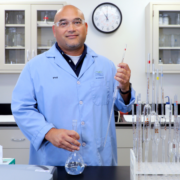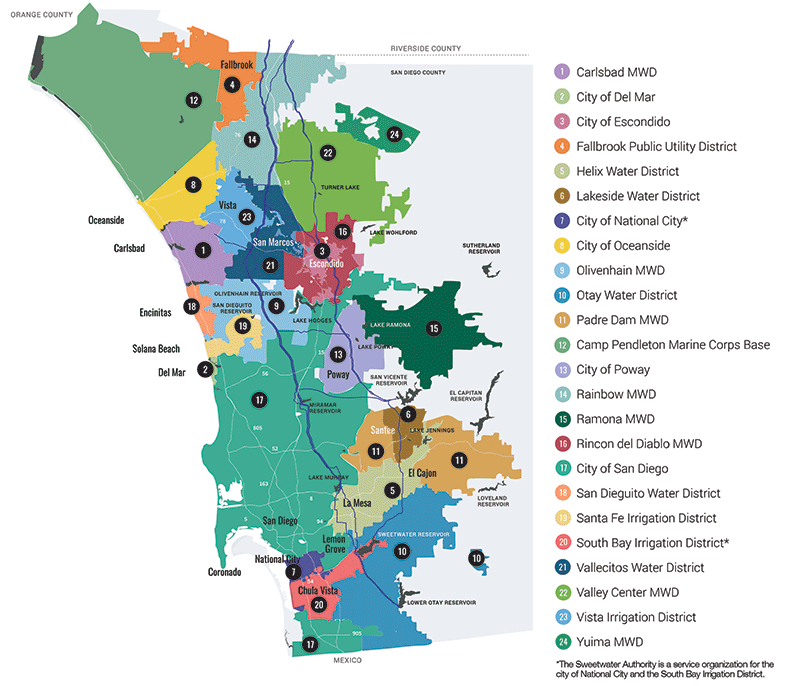The San Diego region’s water and wastewater agencies have a long tradition of supporting holiday charitable giving to a wide array of nonprofit services. The tradition continues in 2020 with no slowdown despite the challenges of the coronavirus pandemic.
Toys bring joy to kids in need
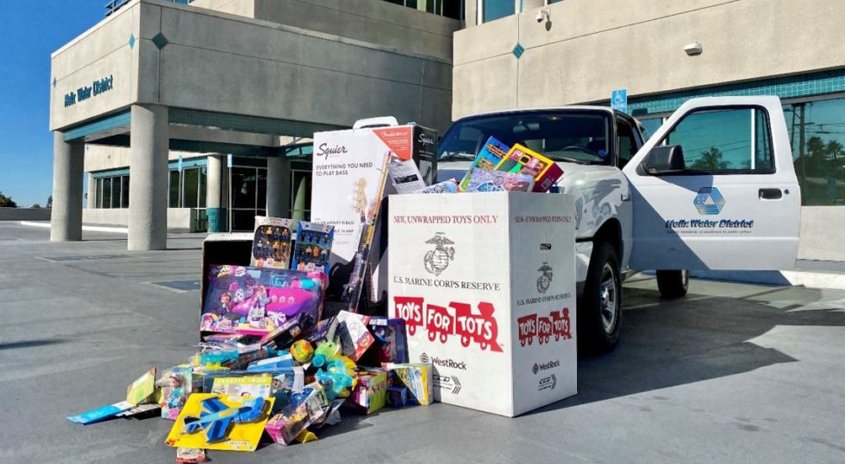
Helix Water District employees, board members and customers donated virtually and in person to the agency’s Toys for Tots drive, which will provide holiday gifts to less fortunate children throughout East San Diego County. Photo: Helix Water District
For more than 15 years, Sweetwater Authority employees have been active participants in the Salvation Army Angel Tree program, providing toys to children in its service area. Every year, employees take a tag that contains information about the recipient (age, gender, toy request). The employee shops for the item and brings them back unwrapped to the office. The Salvation Army pickups and delivers the donated toys.
With many employees working from home this year due to the pandemic, several made arrangements to have their gifts shipped directly to the office, or stopped by to drop off a gift.
“Every year, I enjoy seeing the collection of toys selected by our employees for the children of South Bay. I am always so proud of the generosity and kindness of our team – It is one of the joys of the holiday season,” said Tish Berge, Sweetwater Authority general manager.
Helix Water District staff is donating to the Marine Corps Toys for Tots Program, and encouraged its customers to participate. Each holiday season, the U.S. Marine Corps partners with local nonprofits and businesses to collect toys for distribution to children. Helix employees at all four of the district’s facilities collected new and unwrapped toys. “If there was ever a time to help families in need, this is it,” said Helix spokesperson Vince Dambrose.
San Diego County Water Authority employees enthusiastically support Toys for Tots through its Employee Association. President Angela Tomayko, administrative assistant to the Colorado River Program and MWD Program, said employees will donate $500 toward the purchase of toys for the program.
San Diego Food Bank virtual drives provide assistance
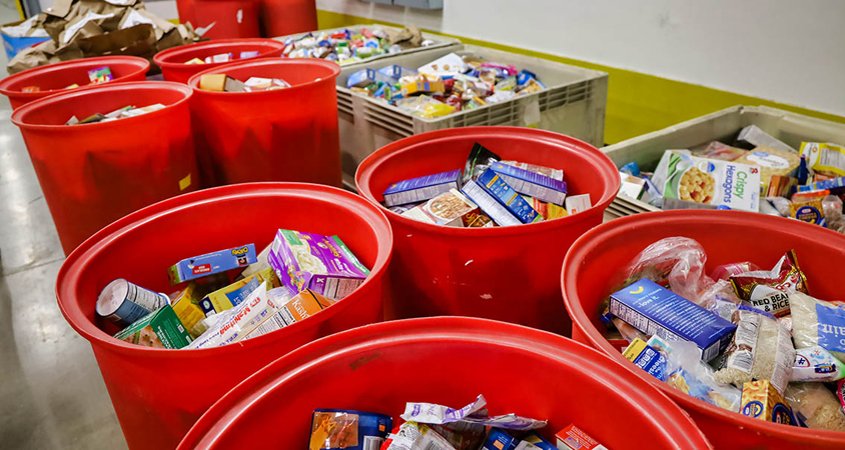
The San Diego County Water Authority and numerous member water agencies continue to support the San Diego Food Bank during the holiday season. Photo: San Diego Food Bank
Early in the pandemic, the San Diego County Water Authority and its member agencies launched a virtual food drive in partnership with the San Diego Food Bank to provide assistance to those affected by the pandemic.
The Otay Water District was an original partner in the virtual food drive and has continued its commitment along with its nearly 226,000 customers, employees, and any supporter able to donate. As a result of its holiday season efforts, the Otay Water District raised $5,400 in food and monetary donations for the Food Bank.
“Because of the economic impacts of the coronavirus crisis, demands for food and aid have skyrocketed across the county,” said Tenille Otero, Otay communications officer. “People are without jobs, without paychecks, and without money to feed and support their households. Through the food bank effort, the District, its employees, and customers can assist those affected by the pandemic.”
Helix Water District also partnered directly with the San Diego Food Bank early in the pandemic, raising more than $6,000 for the program. Both the food drive, and its Toys for Tots effort are run as part of the “Helix Helps” program created in 2017. Helix employees, families and friends volunteer their time to support the communities the district serves.

City of Escondido employees participate in the annual “PJ Angels” program. New pajamas are collected for multiple local agencies serving children in crisis. Photo: City of Escondido
City of Escondido employees including the water and wastewater divisions put together “Souper Sacks,” bags of non-perishable food and fun surprises distributed through the city’s senior program at the Park Avenue Community Center. Last year, 341 Souper Sacks were donated.
In addition, employees participate in the annual “PJ Angels” program. New pajamas are collected for multiple local agencies serving children in crisis. Children receive a new set of pajamas to bring them comfort during their most challenging moments.
In previous years, items were delivered to the nonprofits with an escort by the Escondido Fire Department. “This year, distribution will be lower key, but participation in both of these longstanding programs has not waivered,” said Teresa Collins, Escondido communications manager.
Supporting clean water worldwide
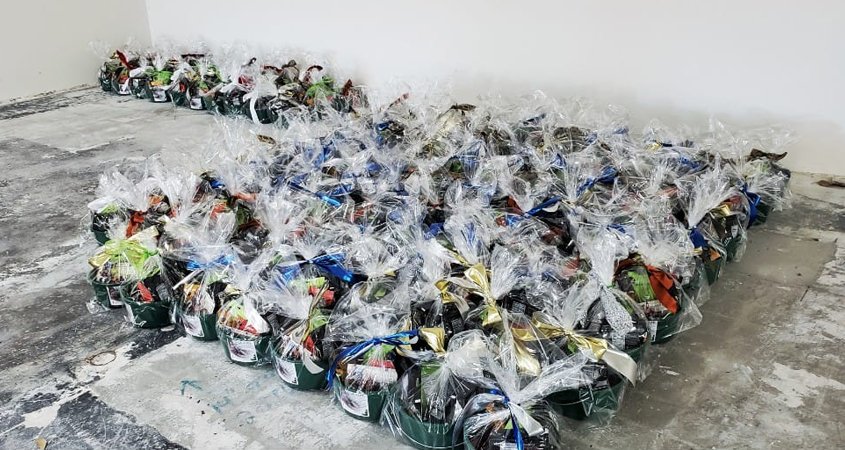
Baskets of Wonderful Pistachios benefit the Water for People program year after year. Photo: Water for People
For 15 years, Olivenhain Municipal Water District employees have enthusiastically supported fundraising for the nonprofit Water for People. It works with communities across the globe to install safe water and sanitation systems, educating local people on good health practices and saving thousands of lives. Olivenhain employees have volunteered abroad helping set up water and sewer systems with the full support of the agency.
During the holiday season, the San Diego chapter holds a competition to sell the most gift baskets donated by Wonderful Pistachios. Employees help assemble the baskets for sale. Olivenhain hoped for a “three-peat” win but settled for a close second place, selling 179 baskets.
Water Authority employees also purchased baskets. Employee Association President Angela Tomayko noted, “they sold out quickly!”
Olivenhain employees are playing Santa Claus to a family of seven, a local senior, and a veteran in its annual adopt-a-family effort, and filled a truck bed with donations for the San Diego Humane Society. Employees also participate with paycheck deductions through the United Way.
“We like to cast a wide net to make the season brighter for as many as we can – seniors, children, vets, and even four-legged friends,” said Teresa Chase, administrative analyst.
“I enjoy shopping for the families and I like collecting for animals, too,” said district accountant Lisa Maxwell, who has worked at Olivenhain Municipal Water District for 23 years. “It’s just something that brings joy. We could use it, this year especially.”
Water Authority employees embrace philanthropy year-round
This year, the Water Authority established a new employee-driven Charitable Giving Committee to support nonprofits year-round. Chair John Kross, Engineering Department right of way manager, and committee member Liz Mendelson-Goossens, principal water resources specialist, MWD Program, said the committee has established new guidelines and surveyed employees to select recipients, the San Diego Food Bank, San Diego Humane Society, and Rady Children’s Hospital.
Without the ability to hold face-to-face events, the committee launches its first virtual fundraiser with a holiday theme. Through the end of the year, employees can compete in a holiday attire contest, donating to enter a photo in one of three categories: Ugliest, Most Creative, and Best Homemade. Fellow employees will vote on the winners.

